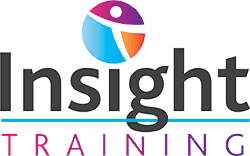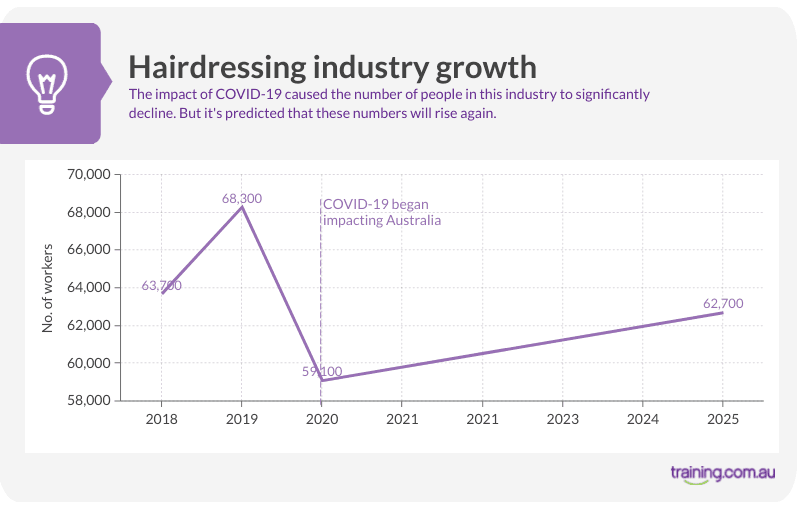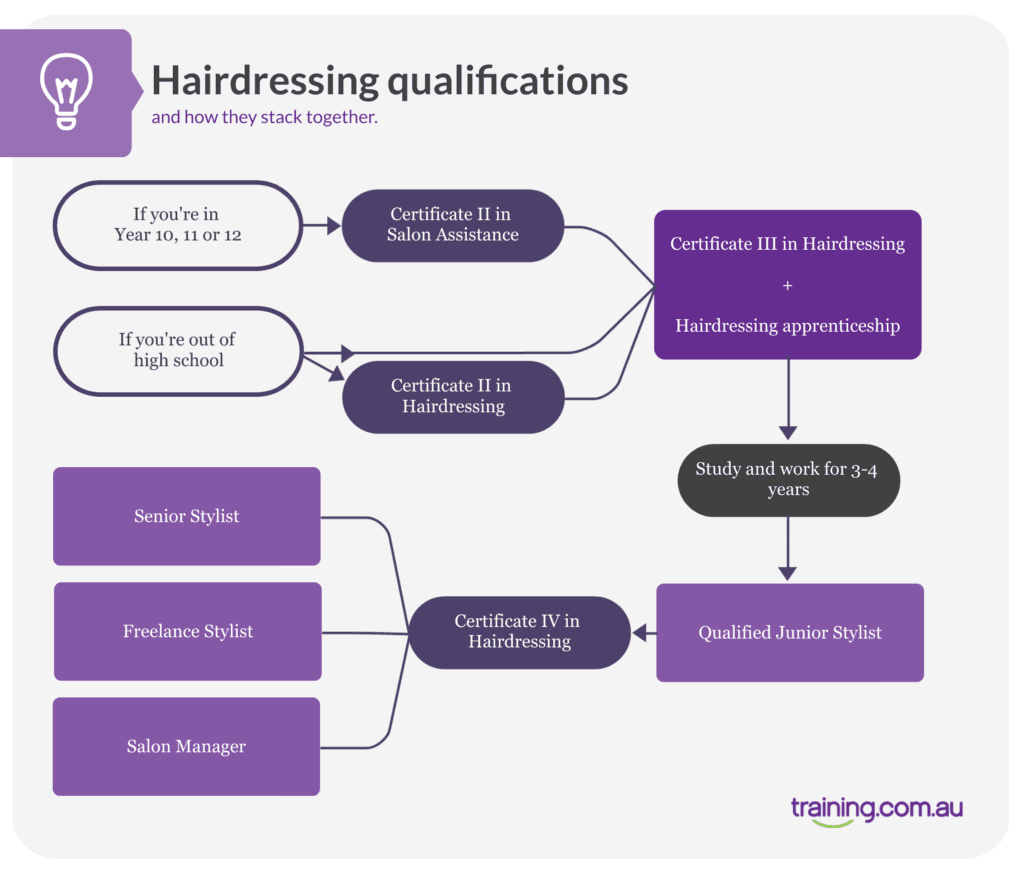Hairdressing Apprenticeship Guide: Everything you Need to Know

Becoming a hairdresser in Australia is a great career choice. If you’ve got an eye for detail, you’re outgoing and friendly, and you love to work with your hands, you’ll definitely thrive as a hairdresser.
The road to becoming a hairdresser in Australia is a little bit complicated, but this guide takes you through the entire process. It will give you insights on:
- How to become a hairdresser in Australia
- How to get a hairdressing apprenticeship
- Hairdressing apprenticeship information
This guide also explores the hairdressing industry and offers insights into where your career can take you.
You can be any age to start an apprenticeship and there are plenty of mature age apprentices out there.
Hairdressing is a large, steady business in Australia that’s currently employing over 59,100 people. The majority of these workers are female (85%) in the 25-34 age bracket.
Hairdressing also offers both full-time and part-time work opportunities. Just under 50% of current hairdressing professionals work part-time hours, allowing plenty of time for other life commitments while still building a career!
How to become a hairdresser in Australia
Find a salon to employ you as an apprentice.
This will likely be the biggest hurdle to becoming a hairdresser, but you’ll be able to find an employer with a little persistence. If there’s a salon you’re passionate about working in, approach them directly and explain why you’d like to work there and what you can offer them — think of it as an on-the-spot job interview.
If you’re not fussy about which salon you complete your apprenticeship at, you can ask enrol in a course first and ask the RTO you’re studying with to source a salon to employ you.
Enrol in your chosen hairdressing qualification.
This is commonly a Certificate III in Hairdressing (SHB30416), and it must be completed with an RTO. The salon you work for may specify their preferred RTO. A hairdressing apprenticeship can take three to four years to complete.
Alternatively, you could complete the Cert III in Hairdressing alone, which will take one year of full-time study. But this may not be the best way to study, as you won’t gain the practical experience that salons are looking for in junior stylists.
Get a job as a junior stylist and progress your career.
Once you’ve completed your apprenticeship or Cert III, you’ll be a fully qualified hairdresser. You’ll be able to get a job in the industry with the title, “Junior Stylist” (pretty schmick). And from there, you’ll continue to gain mentorship from senior stylists and work your way up.
What qualifications do you need to be a hairdresser?
A hairdresser’s education is important because it creates a foundation for the practical and theoretical skills they’ll use for the rest of their career.
To become a fully qualified hairdresser, you must complete a hairdressing apprenticeship or at least hold a Cert III in Hairdressing. The good news is that there are minimal requirements for beginning your apprenticeship. You only have to be over 16 and have a minimum completion of Year 10 Literacy. If you don’t have this Year 10 Literacy pre-requisite, you can apply to study a VCAL Hair and Beauty course alongside your Year 10 studies at school. The Certificate II in Salon Assistance (SHB20216) is a great option for you!
A hairdressing apprenticeship allows you to study the technical aspects of hairdressing and give you hands-on work experience to put those skills into practice in a professional environment.
To get your first hairdressing apprenticeship, you’ll need to find a salon that will take you on as an apprentice. You’ll need to enrol in a Certificate III in Hairdressing (SHB30416) with an RTO, and the salon may specify their preferred RTO.
When it comes to studying hairdressing, there are a variety of qualifications available. They all stack together to offer a well-rounded learning experience.
This is the order hairdressing qualifications stack together in Australia:
Will allow you to work as a salon assistant on a hairdressing team.
This qualification is an introduction to working as a hairdresser and the industry in general. This qualification will teach you:
- Basic hairdressing and styling techniques
- How to communicate and work effectively as part of a hairdressing team
- How to interact with clients (e.g.: consulting and booking appointments)
- How to assist other hairstylists
While you won’t be able to work independently with a Certificate II, it’s a great way to get started in the industry before you undertake further training. It will give you a solid foundation of skills to help you complete a hairdressing apprenticeship.
This qualification is optional, but will also increase your chances of getting hired as an apprentice at a salon.
Will allow you to work as a fully qualified hairdresser in a salon.
This qualification gives you all the skills and knowledge you need to succeed as a hairdresser. The techniques you’ll learn are industry relevant and up to date.
A Certificate III in Hairdressing will teach you how to:
- Cut and style hair
- Colour hair (like applying permanent and semi-permanent colour and highlights)
- Apply chemical treatments to hair
- Give client consultations
- Apply the hair and scalp treatments
You’ll also learn the science of hair, how to use salon tools and how to work safely in a salon. Once you’ve completed the Cert III you’ll be a fully qualified hairdresser, and you’ll start out as a junior stylist.
This course can be taken with an apprenticeship over three to four years. Without an apprenticeship, the course can be completed over one year.
For a salon to employ you as a hairdresser, you’ll be required to hold a Certificate III or have completed a hairdressing apprenticeship.
Will allow you to run your own salon, become a salon manager or work as a freelance hairdresser.
This qualification can be completed after any of the preceding qualifications to build on your existing skills. Work experience as a hairdresser is a prerequisite for this course, as It will teach you complex, highly technical skills. These new skills will allow you to work as a senior or freelance hairdresser, or coordinate operations of a salon.
It’s also an important qualification to have if you want to specialise in a niche within hairdressing.
You’ll be able to work self-directed (making your own stylistic decisions for clients) and will likely support and train more junior hairdressers.
Over
OF HAIRDRESSERS COMPLETE THEIR APPRENTICESHIP VIA A CERTIFICATE III OR IV IN HAIRDRESSING
If you’re unsure about hairdressing, but you’re interested in the beauty industry, there are also more general beauty courses such as a Diploma in Beauty Therapy or a Certificate IV in Beauty Therapy, which includes learning about massage, facials, waxing and more.
What’s involved in a first-year hairdressing apprenticeship?
In a first-year hairdressing apprenticeship, you’ll get to dive into the professional environment of hairdressing and have your learning guided by the professionals running your course and the hairdressers working in your salon.
While studying hairdressing, you’ll work through a variety of modules that will impart relevant skills. Your studies will likely be a mix of technical knowledge and practical skills.
During the practical aspects of your apprenticeship, you will be learning and refining your hairdressing skills.
First-year hairdressing apprentices generally assist with the upkeep of the salon, deal with clients (normally at reception), carry out some basic hairdressing services and assist colleagues. Be prepared to spend most of your time on your feet, moving around the salon. And it’s important to ensure you can be flexible and adapt to whatever schedule your salon wants you to work.
As you learn more and complete assessments, you’ll get to expand your duties within the salon.
Assessments during an apprenticeship include hands-on work (such as workplace tasks), written assignments, tests and team projects.
Hairdressing in Australia — an overview of the job
Hairdressing is a skill needed in multiple industries, including retail, health and social care and education. However, most hairdressers find themselves working within the beauty industry either in salons or as mobile hairdressers.
Some of the hard skills involved within hairdressing include:
- Shampooing and conditioning hair and scalps
- Cutting hair with relevant instruments
- Styling hair – temporary and permanent (special occasions looks, dread-locking, and perms)
- Colouring, toning and highlighting hair
- Cleaning the work area and instruments
- General hair care and health appraisals
- Computer and booking management skills
- Payment handling
However, hairdressing is not just about hard skills. ‘Soft skills’ or interpersonal skills are incredibly essential as a hairdresser. We’ve all been to the salon before and accidentally spilled our guts out to our hairdresser.
And they seem like great listeners, right? So, you can imagine their people skills have to be pretty impressive. Hairdressing is a social job and requires excellent customer service skills.
Some of the soft skills involved in hairdressing include:
- Be able to actively listen to your client and understand what they want/need
- Offer your professional advice or opinion about the clients’ hair
- Take on and handle criticism from clients and management
- Manage your time efficiently
- Being able to read a customer’s body language and facial expressions to ensure all needs are being met
Like carpentry, hairdressing is also an apprenticeship. Hairdressing is more than just grabbing a pair of scissors and hoping for the best. It involves precise motor skills, in-depth industry knowledge, organisation and fantastic customer service skills. That’s why completing a hairdressing apprenticeship is essential to begin your hairdressing career.
Career options for hairdressers
What many people don’t realise is that there are multiple career opportunities within hairdressing! There are numerous roles available to you after completing your apprenticeship and gaining more experience in the industry – it’s just up to you what part of hairdressing you enjoy the most!
Some careers are:
Salon owner/manager
Owning and managing your own salon includes not only being a professional at your craft but also being able to run a business. This includes administrative work, as well as client and employee supervision.
Product consultant
Whether you work for a specific client or salon, this role is all about those beautiful hair products we love when we go to the hairdressers. This job includes understanding industry products, quality checking, product demonstrations, and ensuring all staff understand the product and its use.
Colouring specialist
We’ve all experienced or heard of a bad die-job. As a colouring specialist, it’s up to you to ensure you never give someone a bad colouring experience, as well as fixing other technicians’ mistakes. You’ll be a master at all things dies, pigments and toners.
Salon assistant
Not all salons have a specific administrative role, but if they do, the salon assistant is usually responsible for this role. This role includes helping hairdressers with their duties while ensuring all bookings are running smoothly and payment is taken.
By completing a hairdressing apprenticeship, you’re given a hands-on approach to learning the required skills for one of the most steady, reliable businesses in Australia. Within a year, you could be a newly qualified hairdresser with multiple career pathways at your fingertips. If you’re a social, practical, hands-on person, this is the career for you!
Browse Results
Diploma of Counselling
There is a growing need for people who can offer support services to adults and teenagers who may need support and guidance. If you have the desire to help people lead a happier life to reach their full potential, a career as a professional Counsellor...

Diploma of Nursing
Build a meaningful career that makes a difference with the HLT54121 Diploma of Nursing. This nationally recognised qualification provides the essential skills, knowledge, and practical training needed to become a qualified Enrolled Nurse in Australia....


Certificate III in Community Services (WA Only)
The Certificate III in Community Services is perfect for entry level community services workers who support individuals through the provision of person-centred services. Work may include day-to-day support of individuals in community settings or suppor...

Bachelor of Health Science (Clinical Nutrition)
Clinical nutritionists integrate traditional food wisdom and current scientific evidence to motivate individuals and communities to eat well and live healthier lives. The Bachelor of Health Science (Clinical Nutrition) is supported by a strong underpin...

Bachelor of Health Science (Naturopathy)
Naturopathy is a whole medical system combining theory (philosophy and principles) and practise that uses an array of natural therapies to support healing and maintain health. Naturopaths aim to treat the underlying causes of illness and disease. The c...

Certificate III in Community Services (Perth Only)
Are you a natural when it comes to providing guidance to people? Would you like to kick start a career in Community Services? The Certificate III in Community Services (CHC32015) is the perfect entry-level qualification for prospective Community Servic...

Certificate III in Individual Support (Ageing OR Disability) (Perth Only)
If you have a passion for helping those most in need, this qualification is one way you can utilise your knowledge for the benefit of others. Package the Certificate III in Individual Support (Ageing or Disability) (CHC33021) to save time and gain know...

Certificate lll in Early Childhood Education & Care (Perth Only)
If you love working with children and want to learn more about providing quality education and care in a range of environments, this course is for you. The Certificate lll in Early Childhood Education and Care (CHC30121) can provide you with an entry-l...

Certificate III in Individual Support (Disability) (SA Only)
The Certificate III in Individual Support (Disability) is designed to equip you with the practical skills and knowledge to support people living with disability in a variety of care settings. With a focus on person-centred support, you’ll learn how to...


Diploma of Community Services (Perth Only)
The Diploma of Community Services qualification reflects the roles of community services, case management and social housing workers involved in the managing, co-ordinating and/or delivering of person-centred services to individuals, groups and communi...

Certificate IV in Business (Perth Only)
This qualification is suited to those working as administrators and project officers. In this role, individuals use well-developed skills and a broad knowledge base to apply solutions to a defined range of unpredictable problems and analyse information...

Certificate III in Process Manufacturing (Perth Only)
The Certificate III in Process Manufacturing is designed for those working or looking to work in production, warehousing, or factory roles. This hands-on course equips you with the practical skills needed to operate machinery, follow safety procedures,...

Certificate III in School-Based Education Support (Perth Only)
Are you interested in becoming a teacher’s aide? Work with teachers to create a comfortable and supportive environment for children’s learning. You will ensure lessons run smoothly while also developing the student’s literacy, numeracy and resear...

Certificate III in Allied Health Assistance (Perth Only)
A Certificate III in Allied Health is your entrance into the world of health services! This course will teach you to support workers in a range of fields such as audiology to social work. You will use your qualification to gain an entry-level job in ei...

Certificate III in Individual Support (Perth Only)
This qualification is for those who want to work in the community or in a residential setting, following a customised plan to give person-centred assistance to individuals who may need it due to ageing, disability or other circumstances. Work involves...

Certificate III in Allied Health Assistance (Perth Only)
Are you interested in entering the health services industry? This nationally recognised qualification will allow you to enter into one of the most rewarding and enjoyable careers! When studying this course, you will gain knowledge in a range of fields...

Bachelor of Health Science (Acupuncture Therapies)
Acupuncture is a branch of Chinese Medicine that stimulates specific points on the body to regulate the flow of Qi (vital energy) to restore health and balance the functions of the body, mind and spirit. Acupuncture therapies combines Chinese medicine...

Bachelor of Health Science (Chinese Medicine)
Chinese medicine is a whole medical system that seeks to balance the functions of the body, mind and spirit and restore health. It combines theory (philosophies and principles) and practices including acupuncture, moxibustion, medical Qi Gong, Chinese...

Diploma of Beauty Therapy (QLD Only)
As a beauty therapist, you become one of your clients most trusted confidants who they look to for advice on which beauty treatments and products are going to make them look their best. Imagine having that sort of impact on someone’s life. As a Beauty...

Diploma of Remedial Massage (QLD Only)
As the world becomes more mindful of the benefits of natural therapies, disciplines like remedial massage are becoming increasingly in demand. They provide patients with drug-free support to manage pain, injury, and rehabilitation. As a remedial massag...




